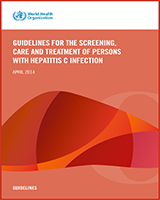The overarching objective of WHO is to achieve the highest possible level of health for all people. These guidelines have been developed with this principle in mind and that of the United Nations Universal Declaration of Human Rights.101 People infected with HCV are commonly subject to discrimination and stigma, and it is thus essential that these guidelines and policies derived from them incorporate basic human rights, including the right to confidentiality and informed decision-making when considering whether to be screened and treated for HCV infection.
3.1. Human rights
The protection of human rights for all persons infected with HCV is a central precept of these guidelines. People with HCV infection frequently come from vulnerable groups because of low socioeconomic status, poor access to appropriate health care, or because they belong to groups that are marginalized or stigmatized such as PWID or prisoners. Thus, screening for HCV must not be used as a means to discriminate against those testing positive, for example, by denying them employment or education. The promotion of human rights and equity in access to testing and treatment are guiding principles central to these guidelines.
3.2. Access to health care
Access to health care is a basic human right and applies equally to men, women and children, regardless of gender, race, sexual preference, socioeconomic status or behavioural practices, including drug use. Policy-makers should ensure that antidiscrimination laws protect vulnerable groups and confidentiality principles, as outlined in the Declaration of Geneva, 2006.102
3.3. Service provision
Providing quality screening, care and treatment for persons with HCV infection requires involvement of appropriately trained individuals as well as facilities suitable for the regular monitoring of patients, especially those on therapy. Facility requirements for providing treatment for HCV will depend on the setting, but will always require access to appropriate laboratory facilities for monitoring the toxicity and efficacy of treatment, and adequate supplies of medication (including refrigeration facilities for PEG-IFN). Operating testing services under quality management systems is essential for the provision of quality testing results. The protection of confidentiality and a non-coercive approach are fundamental principles of good clinical practice. Acceptability of services is a vital component of health care, and service delivery should ideally involve patient-representative organizations and peer-support groups.
3.4. Integrated health care
Persons infected with HCV often require additional health care. Rates of depression in HCV-infected populations are high, opioid dependency is common in PWID and persons coinfected with HIV require additional treatment. Prisoners or people with a history of incarceration such as PWID have high rates of HCV infection and may be at risk of infection with TB in many settings, in particular, multidrug-resistant TB. Screening for co-morbidity is therefore an important consideration in patients who will be screened and potentially treated for HCV. Integration of health-care services requires adaptation to the services available in individual countries. Consultation with and involvement of community organizations (including drug-user organizations) is central to the principle of integrated health care.


